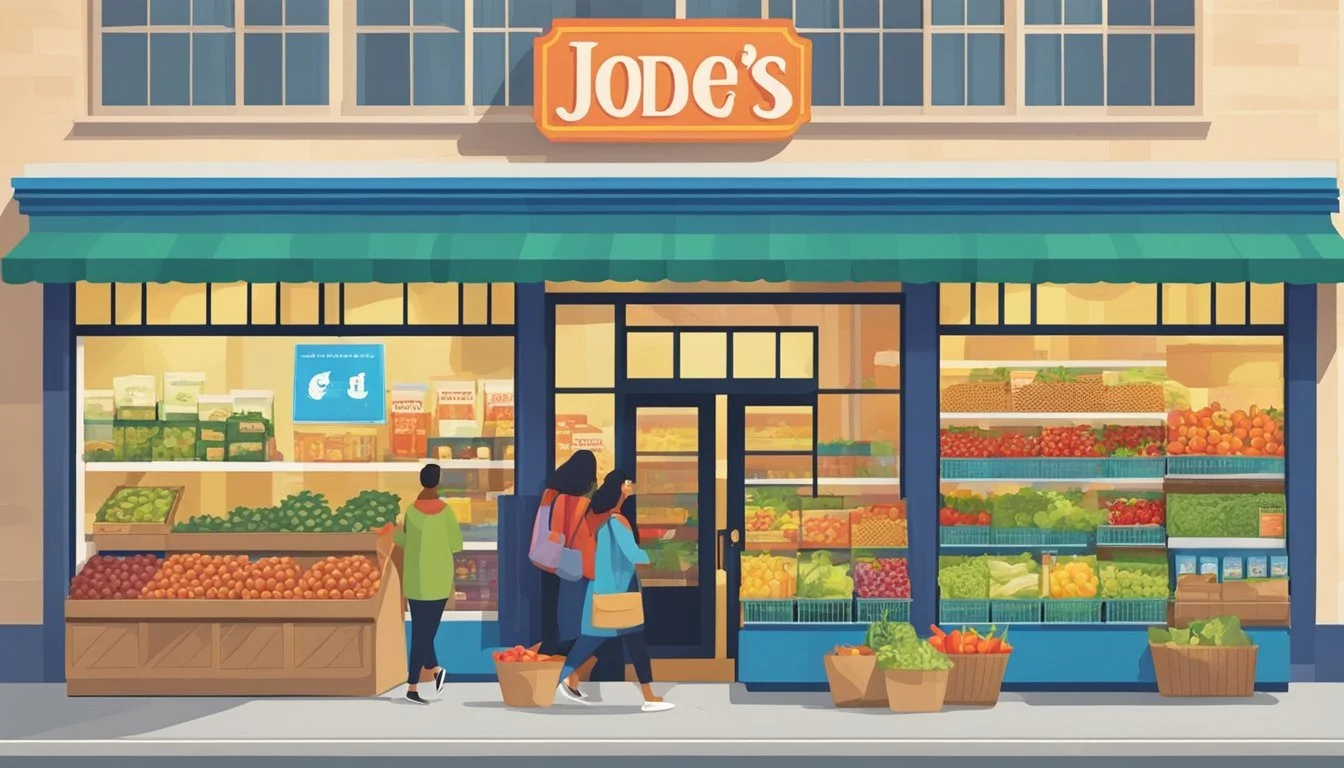Trader Joe's vs Lidl
Comparing Quality, Prices, and Selection
Part of Our Grocery Store Guide with Details on Trader Joe's and Lidl
Navigating the crowded landscape of supermarkets can be a daunting task for shoppers looking for quality and value. Trader Joe's and Lidl are two grocery store chains that have garnered attention for their unique shopping experiences and competitive pricing. Trader Joe's, a beloved brand in the United States, distinguishes itself with a curated selection of private-label products, often organic or non-GMO, and a quirky, friendly store environment. Lidl, on the other hand, is a global powerhouse with a strong European presence that has made significant inroads into the US market, offering a no-frills shopping experience that mixes private-label goods with brand-name products.
Comparing Trader Joe's and Lidl presents an interesting study in the contrast of business models and customer experiences. Trader Joe's has cultivated a loyal following with its eclectic array of products, including the "Trader Joe's" brand that covers everything from frozen meals to snacks and beverages. Meanwhile, Lidl's hybrid approach marries the simplicity of the discount grocery model with wider selections often found in conventional supermarkets, making it an emerging competitor for cost-conscious consumers who do not wish to compromise on variety.
As both stores vie for the attention of thrifty shoppers, the question of which store is better hinges on several factors including pricing, product quality, store ambiance, and overall value. Picking the right grocery store is not just about savings but also about the shopping experience and the diversity of offerings. In examining Trader Joe’s and Lidl, one must look beyond the price tags to the full spectrum of what each brand delivers to its customers in terms of product quality, store experience, and overall satisfaction.
Company Background
In evaluating Trader Joe's and Lidl, it's essential to understand their origins and growth trajectories which reflect their unique identities as major players in the supermarket landscape.
Trader Joe's History
Trader Joe's began as a small chain of convenience stores called "Pronto Markets" in 1958. In 1967, the founder Joe Coulombe changed the format to the now-famous Trader Joe's and opened the first store in Pasadena, California. What makes Trader Joe's stand out is its unique selection of private-label products and its nautical theme, which reflects Coulombe's belief that grocery shopping should be an adventure. This American chain with a personality all its own was sold in 1979 to a German-owned operation, the Albrecht family, which also owns the discount supermarket chain Aldi. Despite this, Trader Joe's retains a distinct brand identity separate from Aldi. The chain has expanded significantly, now boasting a robust U.S. footprint with a concentration of stores on both the East Coast and West Coast.
Lidl's Expansion
Conversely, Lidl started its journey in Germany in the 1970s and has since become a well-recognized German-owned operation across Europe. Known for its discounted prices without the need to buy in bulk, Lidl has since turned its sights on the international scene. Entering the U.S. market in 2017, Lidl aimed to establish its presence through an aggressive expansion strategy. Lidl's charm lies in its no-frills shopping experience with a rotating selection that keeps customers intrigued. With a significant foothold in Europe, Lidl continues to extend its U.S. footprint, focusing on states across the East Coast and building on its reputation as a formidable presence in the supermarket sector.
Store Experience
When comparing Trader Joe's and Lidl, shoppers will notice distinct differences in store layout, customer service, and overall in-store experience that can significantly affect the grocery shopping journey.
Layout and Design
The layout and design of a store contribute greatly to the shopping experience. Trader Joe's is known for its unique and somewhat eclectic decor that reflects local flair, which can make the shopping experience feel more personalized. Aisles are generally well-signed, helping customers navigate the store. Conversely, Lidl stores offer a more standardized European-style layout with a focus on efficiency. Open spaces and wide aisles are characteristic of Lidl's design, with clear signage that directs shoppers through a logical flow from one department to the next.
Customer Service
Customer service is a critical element of the grocery store experience. Employees at Trader Joe's have a reputation for being friendly and helpful, often going out of their way to assist customers. The store is also known for its generous employee policies, which may contribute to the positive attitudes observed on the sales floor. Lidl, while also providing competent service, tends to have fewer staff members visible on the floor, which can sometimes lead to longer wait times for assistance.
In-Store Experience
The in-store experience at Trader Joe's and Lidl varies substantially. At Trader Joe's, customers may encounter free samples and product demos that encourage trying new items. Such interactions can make shopping engaging and interactive. Lidl, on the other hand, focuses on a no-frills, get-in-get-out approach with limited free samples, putting the emphasis on speed and convenience. While both stores aim to provide a pleasant shopping experience, the atmosphere and interactions within each store reflect their distinct brand philosophies.
Product Range and Availability
In comparing Trader Joe's and Lidl, one must consider the diversity and consistency of stock within their respective product categories. Consumers will find variances in fresh produce, dairy, meats, and bakery items that may influence their shopping preferences.
Fresh Produce
Trader Joe's produce section is known for a rotating selection of fruits and vegetables that align with the seasons, emphasizing their commitment to freshness. They offer an array of organic options, though their overall produce range may be less extensive than Lidl's. On the other hand, Lidl boasts a larger produce department, with a variety of both local and exotic produce. They often feature promotional deals on produce, making them a potentially more economical choice for fresh fruits and vegetables.
Dairy and Eggs
Both stores offer a variety of dairy products, including a selection of milk, eggs, and specialty cheeses. Trader Joe's has a distinctive line of dairy items that can't be found elsewhere, like their cultured varieties of butter and unique cheese blends. Lidl, conversely, provides a wide range of international dairy brands, and is often recognized for its affordability in staple items such as milk and eggs.
Meats and Seafood
Trader Joe's meat section features pre-packaged, ready-to-cook options that appeal to convenience. Their offerings tend to include more marinated and seasoned meats, which cater to a quick meal preparation. Lidl's meats and seafood selection is more traditional, with a butchery counter where customers can choose from a broader range of fresh, unseasoned meats and seafood, thus catering to those preferring to season their own dishes.
Bakery and Snacks
The bakery section in Trader Joe's carries a variety of bread, pastries, and sweet treats, many of which are made with unique flavors and ingredients. Their snack aisle is a treasure trove of distinctive flavors and health-conscious options. Lidl competes with a bakery that features freshly baked goods including breads, rolls, pastries, and more traditional European staples. Snack-wise, Lidl offers a mix of international and private-label options, often at a lower price point than Trader Joe's.
Throughout all categories, both Trader Joe's and Lidl offer an array of grocery items and frozen items, each with their own branded products that reflect their store identities.
Pricing and Value
When evaluating grocery stores, cost-conscious consumers typically prioritize pricing and value. Both Trader Joe's and Lidl offer competitive pricing strategies aimed at providing customers with savings and low costs, but they approach discounting differently, which is crucial for budgeting shoppers.
Everyday Low Prices
Trader Joe's is known for its everyday low prices, particularly for its private-label products, which are about 21 percent lower in cost compared to traditional grocery brands. Consumers can find savings on a variety of items without relying on sales or promotions.
Lidl, a discount grocer, aggressively positions its prices, often 40 to 50 percent lower than conventional grocery stores. It provides low per-unit pricing, making it an attractive option for shoppers looking for the lowest possible prices on everyday items.
Discount Offerings
While Trader Joe's does not typically offer coupons or weekly sales, it maintains low prices across its selection. This approach simplifies shopping for customers who prefer consistent pricing over hunting for deals.
In contrast, Lidl offers a rotating selection of in-store specials and occasional promotions, further reducing the cost of select items for a limited time. These discounts provide an opportunity for additional savings on top of their already low prices, appealing particularly to bargain shoppers.
Price Comparison
A price comparison of staple items between the two stores reveals varied results. For example:
A basket of 50 common grocery items might total $150.32 at Trader Joe's, whereas the same items could potentially cost significantly less at Lidl, given its typical pricing strategy. These figures illustrate Lidl's stronger position as a low-cost leader, while Trader Joe's holds its own with consistent and reasonable pricing.
Quality and Branding
In the competitive landscape of grocery chains, Trader Joe's and Lidl place a strong emphasis on quality and branding across their product ranges, each with a unique approach to owning brands, offering organic and locally sourced options, and incorporating national brands into their inventory.
Own Brands
Trader Joe's excels with its private-label goods, offering a distinctive range that underscores its brand identity. Customers often associate Trader Joe’s with an eclectic selection of high-quality, private-label products that are both unique and reasonably priced. These items range from gourmet frozen dishes to organic snacks.
Lidl, on the other hand, also boasts a substantial selection of own-brand items, which are recognized for providing competitive quality at lower price points. This strategy involves a rigorous selection process ensuring that their private-label items meet strict quality standards.
Organic and Local Options
Trader Joe's is reputed for catering to the health-conscious shopper with a robust offering of organic produce and private-label goods. They highlight organic options alongside an array of specialty diet items such as gluten-free and vegan products.
Lidl places emphasis on fresh, locally sourced offerings as part of their selection. Their commitment to incorporating local produce into their stores underlines a commitment to freshness and supports local economies.
National Brands
While both grocery stores focus on their own-brands, they approach national-brand items differently. Trader Joe’s rarely stocks national brands, instead favoring their private-label counterparts. Where national brands are present, they are typically ones that align closely with Trader Joe's brand values and image.
Lidl includes a more extensive variety of national-brand items alongside its own brands. This diverse inventory caters to customers seeking both familiarity of known brands and exploration of Lidl’s exclusive products.
Specialty Items
Trader Joe's and Lidl both cater to customers seeking a variety of specialty items, from international flavors to diet-specific offerings. Shoppers can find a range of products to enhance their culinary experience.
Wine and Cheese Selection
Trader Joe's is renowned for its eclectic selection of wines, with options ranging from affordable to premium. Their cheese aisle presents a melange of domestic and imported cheeses, catering to both casual snackers and connoisseurs. Lidl, on the other hand, offers European-imported wines that often carry the prestigious Protected Designation of Origin (PDO) status and pairs them with a respectable cheese selection that includes both staple and artisanal options.
Trader Joe's Wine and Cheese:
Wine: Diverse range, from Trader Joe's exclusive labels to well-known brands.
Cheese: Wide assortment including aged cheddar, creamy brie, and specialty goat cheeses.
Lidl Wine and Cheese:
Wine: Focus on European labels, including French Bordeaux and Italian Pinot Grigio.
Cheese: Selection of European cheeses, including Gouda, Manchego, and specialty blue cheeses.
International Products
When it comes to international products, Trader Joe's offers an intriguing array of items inspired by cuisines from around the globe. They often integrate these products under their own brand, providing shoppers with unique options like Thai lime and chili cashews or Japanese fried rice. Lidl's strength lies in its European roots, with a strong showing of imported goods such as Italian pasta and German chocolates.
Trader Joe's International Products:
Selection: Influences from Asian, European, and Latin American cuisines.
Signature Items: Thai snacks, Italian pasta sauces, and Mexican salsas.
Lidl International Products:
Selection: Predominantly European focus.
Signature Items: Authentic German pretzels, Scottish shortbread cookies, and French preserves.
Diet-Specific Offerings
Both stores are attuned to the needs of customers with particular dietary requirements. Trader Joe's offers a broad selection of gluten-free and other diet-specific foods, prominently featuring them in store aisles and labeling for easy identification. Lidl too provides nutritional options, including a range of organic produce and gluten-free products, but they particularly excel in presenting these items at exceptionally competitive prices.
Trader Joe's Diet-Specific Offerings:
Gluten-Free: Comprehensive offerings including pasta, bread, and snacks.
Organic: A variety of fresh produce and packaged goods.
Lidl Diet-Specific Offerings:
Gluten-Free: Affordable options in bakery and packaged foods.
Organic: A focus on affordability within its organic range.
Locations and Accessibility
When considering the convenience of grocery shopping, the accessibility and distribution of store locations are pivotal factors. Shoppers seek establishments that minimize travel time and maximize convenience.
Store Proximity
Trader Joe's:
Stores: Over 500 nationwide
Presence: Concentrated in urban and suburban areas
Accessibility: Aims to be within a reasonable distance from residential areas, fostering easy access for city dwellers and suburbanites alike.
Lidl:
Stores: Approximately 150 in the United States
Presence: Strongly established on the East Coast
Accessibility: While fewer in number, Lidl stores are strategically located to serve communities with fewer conventional grocery store options, providing an alternative to conventional supermarkets.
Expansion Plans
Trader Joe's:
Strategy: Moderate, steady expansion
Focus: Enhancing locations in existing markets to strengthen their presence and accessibility.
Lidl:
Strategy: Aggressive expansion
Recent Developments: Acquired real estate in new regions, signaling plans for nationwide growth, competing directly with conventional grocery stores and alt-grocers.
The information indicates a competitive landscape where both chains are striving to balance location convenience with their growth strategies, catering to shoppers' need for accessible grocery options.
Customer Loyalty and Programs
In the competitive grocery market, Trader Joe's and Lidl adopt different strategies for fostering customer loyalty. Where Trader Joe's focuses on straightforward pricing, Lidl offers a more traditional rewards system.
Rewards Systems
Trader Joe's has made a strategic decision to not offer a loyalty program. Their philosophy rests on the belief that by not engaging in loyalty programs, they can avoid the extra costs and complications associated with them, thereby keeping their prices low for all customers.
Lidl, on the other hand, participates in a more conventional rewards approach. Customers shopping at Lidl can enjoy a rewards program that offers discounts on store products, further incentivizing repeat visits and fostering a sense of loyalty through savings.
Customer Feedback
Both stores value customer feedback but manage it in distinct ways. Trader Joe's prides itself on creating a friendly, community-focused shopping experience. They gather feedback directly from their customers in stores, helping ensure that their product selection and services meet their customers' needs and preferences.
Lidl may utilize more formal methods such as surveys to gather customer opinions. This feedback loop can influence store offerings and ensure that the rewards system aligns with what customers want. Their active engagement with customer preferences through surveys can help tailor the shopping experience and enhance customer satisfaction.
Conclusion
In the competitive landscape of grocery retailers, the choice between Trader Joe's and Lidl boils down to diverse factors such as pricing, product quality, and shopping experience.
Final Recommendations
Trader Joe's offers a unique assortment of products, often delivering a more curated shopping experience with its own branded items. It provides significant savings compared to traditional supermarkets, with prices about 28 percent lower than those at Whole Foods. Consumers prioritize variety and a more engaging store experience might find Trader Joe's the better fit.
In contrast, Lidl, with its impressively low pricing model, is hard to beat on savings, typically costing 40 to 50 percent less than many other stores for comparable goods. Budget-conscious shoppers who prioritize cost savings and are less concerned with brand exclusivity might prefer Lidl as the ideal grocery store.
Future Industry Trends
The grocery sector is witnessing a shift towards value and convenience, with both Lidl and Trader Joe's positioning themselves strategically. Lidl's expansion and aggressive pricing demonstrate a trend towards more cost-effective shopping solutions that do not compromise on quality. Trader Joe's, maintaining its niche market position, aligns with a trend of providing a unique customer experience that blends product discovery with competitive pricing. As the industry evolves, both stores may continue to adapt their strategies to meet changing consumer demands and economic fluctuations.







